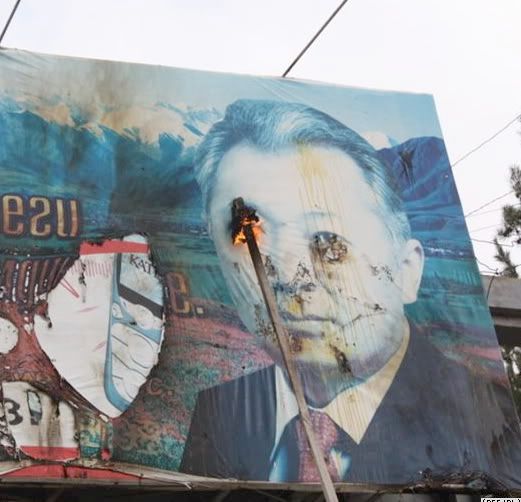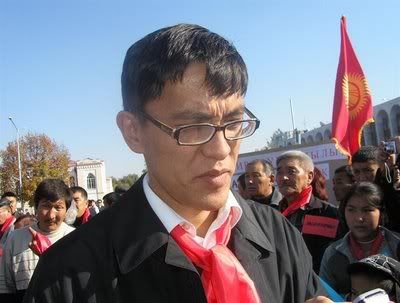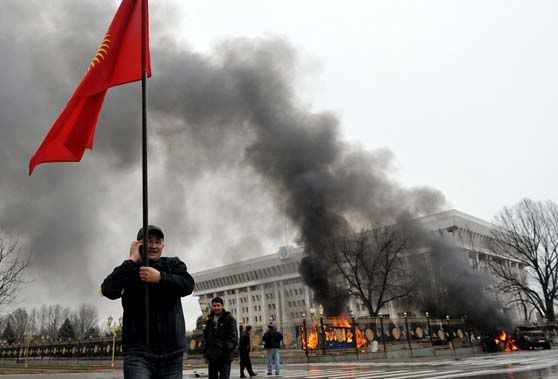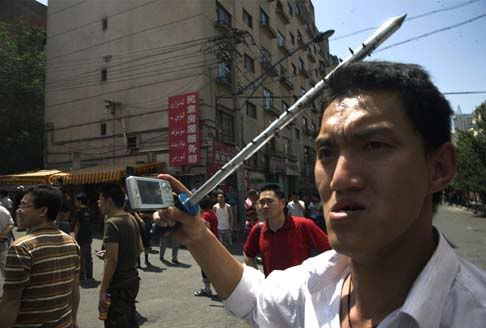
(courtesy of
RFE/RL)
Today, news spread that Kyrgyzstan was
engulfed in political turmoil once again. Just about five years after the protests of the “Tulip Revolution” forced former President Askar Akayev from office, all too familiar reports are coming from Kyrgyzstan that those in opposition to the present president are clashing with police in regions around the country and attempting to take over regional governmental buildings. Thus far, it appears that most of the activity has taken place in Talas, a regional center to the west near southern Kazakhstan, where crowds have taken over the government building (twice actually). Oppositionists, however, pledge to expand the scope of these protests throughout the country in the upcoming days, and, as the following interview shows, the aim is once again to remove the president from office.
When I heard this, I immediately contacted a friend of mine who has been a prime mover in Kyrgyzstan’s politics over the last decade,
Edil Baisalov. The last time I interviewed Edil for this blog was in
November of 2007. At that time, he was making the transition from the world of NGO civic advocacy to that of political representation by running for parliament in Kyrgyzstan. Political machinations in the country, however, led to
accusations that he had violated the elections law, and the government sought him on criminal charges. As a result, he eventually fled to Sweden where he is presently in exile as a political refugee, but he remains, as always, involved in political events in his homeland. As somebody who had taken part in the March 2005 protests that ousted former President Akayev and as somebody who retains close ties with opposition figures in Kyrgyzstan today, Edil offers an interesting perspective on recent events that, while very obviously partisan, is both passionate and informed by lessons of the past. The transcript of an interview I conducted with Edil today follows.
 S.R.: So, can you fill us in on what is actually happening in Kyrgyzstan at the moment?
S.R.: So, can you fill us in on what is actually happening in Kyrgyzstan at the moment? E.B.: Just a few hours ago, after 9:00 pm Bishkek time, Bakiyev’s special riot police simultaneously stormed the Talas oblast government building and arrested several leading opposition members in Bishkek, including Omurbek Tekebaev and Almaz Atambaev. At this time, the people in Talas have retaken the building and are reportedly preparing en masse for a large show of force against the Bakiyev government tomorrow. Also we expect that tomorrow earlier scheduled rallies will take place in Naryn, Issykkul, Alay, Aksy and a few other places.
In the last six months the Kyrgyz people have seen that the Bakiyev family is not content with only falsifying parliamentary and presidential elections and limiting all democratic freedoms. We have witnessed the Bakiyev family boldly violating the Constitution and usurping all powers by destroying the whole structure of state governance. The regime has created an unconstitutional “Central Agency" headed by the 32 year old son of the president, Maxim, that was given total control of the economy, leaving the prime minister and cabinet with no viable powers. We even saw Maxim Bakiyev chair meetings where he scolded the prime minister publicly on TV. We saw the scandal of Eugene Gourevitch, the hailed “financial genius of all government downsizing,” turn out to be linked to a grandiose multi-billion dollar Mafia ring. We saw Kyrgyzstan’s main national assets, such as Kyrgyztelecom and the electricity grid Severelectro ‘privatized’ for less then a tenth of their real worth. Finally, the 300 million USD credit given by Russia to deal with the financial crisis was being mismanaged. In fact, this money allegedly was being reinvested by a semi-private entity controlled by Maxim Bakiyev into bank deposits instead of being used by government for purposes of ‘economic development’ as prescribed by the inter-governmental agreement.
So the warning signs were all there. The people’s “Kurultay” of March 17th listed all the points of frustration with the Bakiyev regime and demanded action. Instead, the Bakiyevs turned off Radio Liberty, blocked websites and blogs, and shut down the last independent newspapers and TV channels. Clearly, the Bakiyev regime does not want to engage the people of the country at this point. The government has even periodically turned off Internet access and mobile phone networks today.
S.R.: Ok, so people are dissatisfied with Bakiyev, but are there particular factors that have led to these protests taking place now?E.B.: There are two factors. The first one informed and influenced the political elite. This was Bakiyev’s attempts to undercut important political actors in the country through politically motivated criminal charges. One of these trials involved former Minister of Defence Ismail Isakov, who was sentenced to eight years in prison for supposedly providing his officer son with an apartment. Another involved former Foreign Affairs Minister Alikbek Djekshenkulov, who was accused both of taking part in the murder of a Turkish businessman and of mismanaging a grant from the Chinese. There are several other cases of political persecution still ongoing. Taken together with the overwhelming evidence that the Bakiyev-operated secret service personnel brutally murdered journalist Gennadiy Pavlyuk in December, these cases proved that the Bakiyev family is not going to tolerate any dissent and wants to run the republic as a medieval khanate.
The second factor that finally ignited mass opposition against the Bakiyevs came with the sharp increase in electricity and utility tariffs. There was also an increase in mobile phone charges. Given that the whole population knows that the Bakiyev family owns these industries, what was already very negative public opinion towards them turned aggressive. Even the last remaining skeptics could not anymore deny that Bakiyev’s government is interested only in maximizing the financial profits of the ruling family, not in serving the national interest.
S.R.: Many people believe that most protests in Kyrgyzstan over the last five years have merely attracted “protestors-for-hire” from various regions, thus representing more the political aspirations of a few oppositionists than a grassroots movement. Are the protests taking place presently in the country any different?E.B.: We will always hear this criticism in a dirt poor country such as Kyrgyzstan. Yes, unemployment is so high that many people have simply nothing to do and would thankfully accept the ride to go to Bishkek or an oblast center to rally. But given the last three years of Bakiyev’s total intolerance of public dissent - during which people in Nookat, Balykchy, Petrovka and elsewhere received harsh jail terms for taking part in rallies – one cannot suggest that the people protesting in Talas are doing it for easy money. The people have had enough. They know that they cannot expect much from government, but at least before there was a system for channeling public frustration with relative freedom of media and political competition. The Kyrgyz people will not accept authoritarian rule. This is a battle for freedoms. All of us understand that if we lose it this time, we will need to submit to decades of dictatorial rule.
S.R.: What do you think will be the result of these protests? Will it lead to real change, and if so, how?E.B.: There has been a great deal of soul searching inside the opposition in the last few years. We know that we essentially failed in reaching our objectives in March of 2005. We came to accept the fact that we were mistaken in believing that removing an authoritarian regime is a success by itself. Not only did we not pay close attention to the personality of Kurmanbek Bakiyev, but we largely let him run the country as an authoritarian leader with little consequences. This time, the opposition believes in much more deep reforms from the beginning if Bakiyev is ousted. These would include a complete dismissal of the judiciary and secret service as well as bans on public service for people who took part in violating constitutional freedoms and other measures. We have a program of clear actions that should be established in the first few months of a new ‘people’s’ government - irreversible changes that will provide the track for future development.
S.R.: Ok, so the goal is regime change. But didn't the opposition also say there would be wide-sweeping reforms after March 2005? Is it not likely that a new government that replaces Bakiyev will become a kleptocracy just as that which replaced Akayev did?E.B.: I would be foolish to promise a modern and transparent democracy over night. The only viable hope is for a lesser kleptocracy, a people-fearing regime that is more or less controlled by a strong system of checks and balances and an active civil society. The struggle for a better future should not and will not stop after a simple regime change. It will require hard work.
S.R.: How should the international community respond to these events?E.B.: We expect world powers, such as Russia and United States, to express in the strongest language possible that the use of force against peaceful protesters is unacceptable. The Bakiyev family lacks the legitimacy to use force against the people. We expect the OSCE troika chaired by Kazakhstan to meet immediately and send a high profile international mediator delegation to Bishkek. There is no solution to the current situation other then early elections. If the Bakiyev family is so sure of themselves, let them stand the test of a ballot in a free and fair environment.
S.R.: Many see the many political protests in Kyrgyzstan as leading to a political system where protests are the only means to be heard. How do you think the country can end that cycle?E.B.: This is the situation where any political system will end up after being denied access to public airwaves and parliamentary halls. The Bakiyevs are repeating the mistakes of the Akaevs and will now face the consequences. The Kyrgyz people are resilient, but they cannot take abuse forever. We are standing up to a tyrant once again!



















